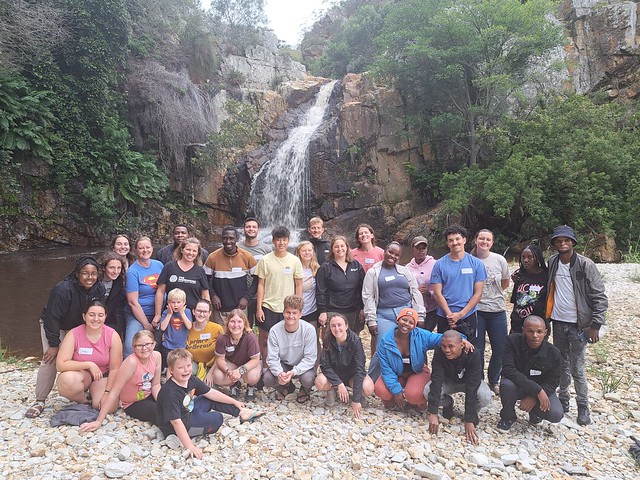Weekend Activities:
We attended a soccer game between the Pirates and the Sundowns on Saturday. This is an important aspect of South African culture. We were on the jumbo tron/TV at least four times and took in the loud and enthusiastic atmosphere.
We were on the jumbo tron/TV at least four times and took in the loud and enthusiastic atmosphere.
We went to church at the Brethren in Christ Church in Hillbrow and were called up to sing in front of a congregation of around 300 people. It was Music Sunday so we experienced a variety of loud South African church music, and heard Andrew preach a sermon. Following the service, we spent the afternoon at Montecasino, an indoor casino with shops, a movie theater, and other fun activities. The church was in a poorer part of the city, while the casino was in a wealthier part, so it was interesting to see the contrast.
Later in the week we also learned how to do some popular South African dances.
Voortrekker Monument/Freedom Park:
During our time here in South Africa, we have studied the history of colonialism as well as the fight for freedom before, during, and after apartheid. The theme of colonialism was a major part of our Monday.  We visited the Voortrekker monument which is a place of remembrance for the Dutch and French colonists (Afrikaners) who made their way from the Cape to the north of South Africa in the 1830s. This monument has been a place of controversy as the history of Afrikaners highlights white supremacy. The next morning we visited Freedom park, directly across from the Voortrekker monument. This place of remembrance points to the history of people who fought for freedom in South Africa. We walked past thousands of names of individuals who fought in various wars, or who died in different ways in the fight for the country.
We visited the Voortrekker monument which is a place of remembrance for the Dutch and French colonists (Afrikaners) who made their way from the Cape to the north of South Africa in the 1830s. This monument has been a place of controversy as the history of Afrikaners highlights white supremacy. The next morning we visited Freedom park, directly across from the Voortrekker monument. This place of remembrance points to the history of people who fought for freedom in South Africa. We walked past thousands of names of individuals who fought in various wars, or who died in different ways in the fight for the country.
Theologians:
This week, we met with a variety of theologians for conversation. In addition to our leaders, Nkosi and Mzi, we got to talk with Dr. Piet Miering, who served on South Africa’s Truth and Reconciliation Commission, Drs. Thomas and de Boer of the University of Pretoria, and Drs van Wygaard, Kritzinger, and Mdingi of the Dutch Reformed Church of Pretoria. Throughout the conversations, we noticed the themes of humility, justice, and the importance of living out your theology. We also learned in more detail the history of the Bible in South Africa, both as justification for oppression and as a source of hope and liberation.
Non-profits:
This week we visited two different community nonprofit organizations one in the township of Soshanguve just outside of Pretoria and another in the Pretoria inner city area. The first that we visited was part of a larger Faith based organization called innerCHANGE South Africa. In Soshanguve innerCHANGE is committed to bettering their community by creating safe environments for the youth of Soshanguve.  Their programs range from cake baking and Bible studies for the younger kids and study hangouts for the teenagers to after-school soccer and basketball training for all ages. They even have a theatre program that rehearses in an abandoned church building. They operate through the generosity of their community both inside and outside of the churches. The second nonprofit was called the Tshwane Leadership Foundation (TLF). Over the past 20 years, they have created many sub-organizations for helping the people of Pretoria. They have many housing units made affordable through government-subsidized rent for women and men, old and young. They also have clinics started to help the homeless with health issues to get care or have a safe place to die with dignity as well as shelters for women experiencing gender-based violence. TLF works closely with the University of Pretoria and many of the churches throughout Pretoria.
Their programs range from cake baking and Bible studies for the younger kids and study hangouts for the teenagers to after-school soccer and basketball training for all ages. They even have a theatre program that rehearses in an abandoned church building. They operate through the generosity of their community both inside and outside of the churches. The second nonprofit was called the Tshwane Leadership Foundation (TLF). Over the past 20 years, they have created many sub-organizations for helping the people of Pretoria. They have many housing units made affordable through government-subsidized rent for women and men, old and young. They also have clinics started to help the homeless with health issues to get care or have a safe place to die with dignity as well as shelters for women experiencing gender-based violence. TLF works closely with the University of Pretoria and many of the churches throughout Pretoria.

